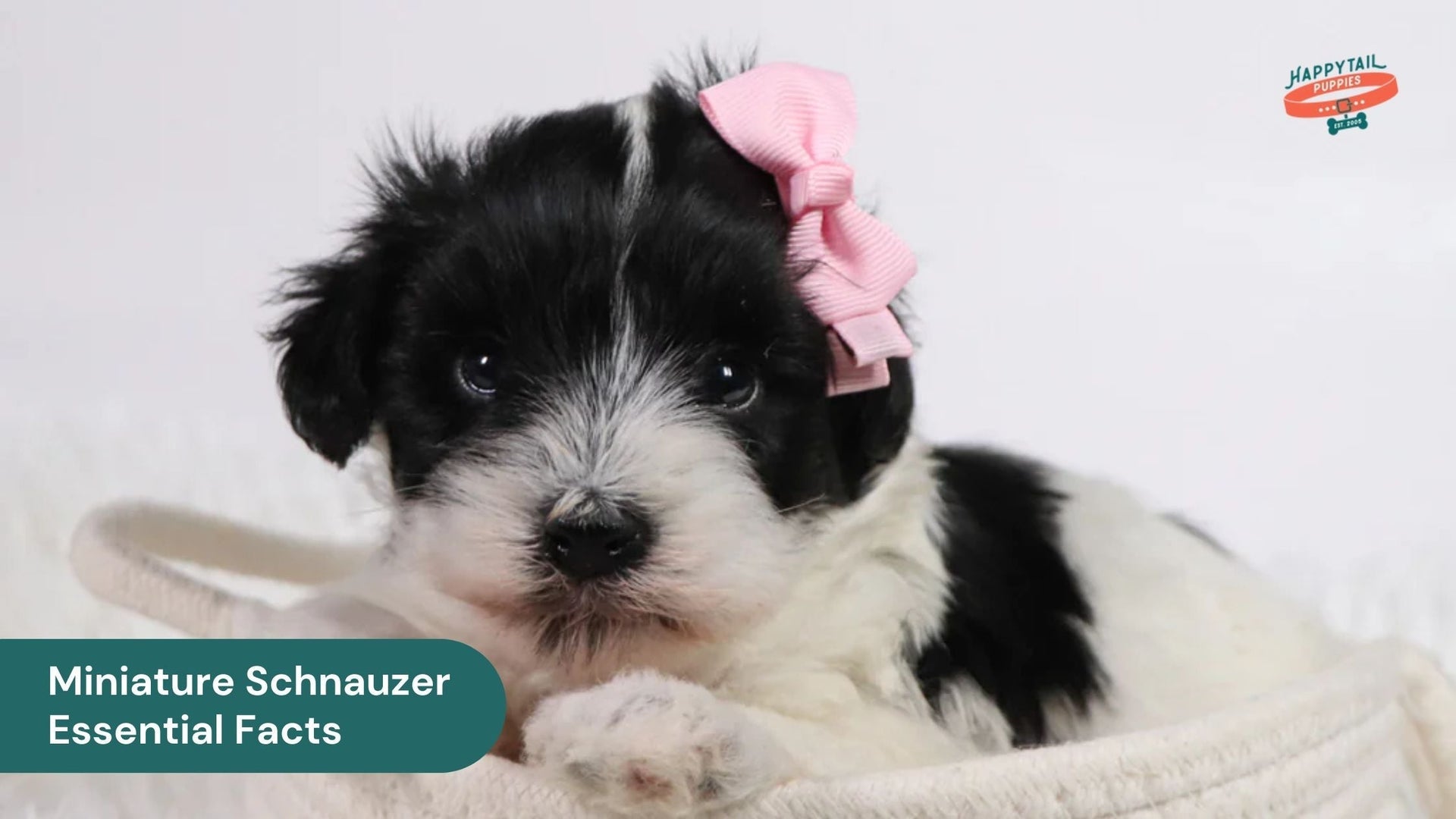Essential Facts About the Miniature Schnauzer You Need to Know
Miniature Schnauzers are smart, spirited, and low-shedding companions with a lifespan of 12-15 years. This guide covers essential facts, from their training-friendly intelligence and strong watchdog instincts to their need for regular grooming.
🐾Table of Contents
- Miniature Schnauzer Facts: An “At-a-Glance” Guide
- The Most Important Miniature Schnauzer Facts for Future Owners
- How to Know If a Miniature Schnauzer Is Right for You
- Health and Wellness: What Responsible Buyers Must Know
- What Makes a Responsibly Bred Miniature Schnauzer Different
- HappyTail Breeder Insights: Life with the Schnauzer Spunk
- Responsible Puppy Ownership: Preparing for Your New Family Member
- Conclusion
Curiosity kicks in immediately when one encounters a Miniature Schnauzer due to their sharp intellect and expressive eyebrows, which make a magnetic first impression. Their playful nature and their little shedding coat make them very attractive to play with and to families that want to have a cleaner home.
Their loving and at the same time spirited mood draws people in easily, which leads to more seriousness in responsible ownership. This guide can be helpful to those who own a dog in the future and want to make well-informed decisions, consider breeding, and be committed to it. In our guide today, we share with you the most essential facts about the Miniature Schnauzer.
Miniature Schnauzer Facts: An “At-a-Glance” Guide
- Personality Snapshot: Miniature Schnauzers are spiritedly intelligent, daringly curious, and loving. Their watchful temperament helps in good watchdog instincts, and the little bossy side helps in training. Families value their loyalty, and this forms good companionship.
- Size and Lifespan Basics: The typical height of Healthy Miniature Schnauzers is 12-14 inches, with the ideal weight of 11-20 pounds. They live 12 to 15 years, just like other small dogs, like the Yorkshire Terrier, which also enjoys a long life span. Regular health checkups, nutrition, and good care keep them healthy and increase their lifespan.
- Hypoallergenic Coat Myth vs. Fact: The owners like their low-shedding coat, yet the breed is not completely hypoallergenic. Regular grooming helps minimize dander, and professional trimming helps maintain the coat's texture. Individuals' allergy friendliness varies, which promotes realistic expectations.
The Most Important Miniature Schnauzer Facts for Future Owners
It is always advantageous for future owners to be aware of a puppy's fundamental characteristics before choosing a puppy. The subsequent sections outline the most valuable lessons for responsible, confident decision-making.
Exceptional Intelligence Enhances Everyday Training
Miniature Schnauzers are quick learners due to their working background, which fosters strong problem-solving instincts and remarkable concentration. The excitement in their training sessions helps families to impart orders with foreseeable effectiveness. The American Kennel Club (AKC) lists Miniature Schnauzers among the 20 most intelligent dog breeds, ranking them high in working intelligence and obedience.
Mental engagement is also necessary, as their busy minds need constant challenges to be satisfied. Puzzles, obedience training, and sniffing games keep them on the edge. The owners who develop routines find it easier to communicate and be dependable with long-term cooperation.
High Prey Drive Needs Guidance
Miniature Schnauzers have an innate prey drive that has developed historically through their ratting responsibilities on farms. Small animals or birds moving quickly often cause an instinctive chasing behavior that may seem out of the ordinary to first-time owners. The importance of leash use stems from the fact that initial recall training is often overwhelmed by outdoor distractions. Proper Miniature Schnauzer care involves diverting this instinct through organized activities.
Safe and productive outlets are formed by diverting their drive through supervised fetch or scent games. Peaceful handling of smaller pets promotes peace. The responsible owners assist in developing behavior that does not overstep instinct without compromising safety or control.
Strong Watchdog Instincts Increase Awareness
Miniature Schnauzers are sensitive to household activity, making them great watchdogs for family members who want a small but alert companion. Their eyebrows are expressive, their bark is sharp, and they help them convey changes in their surroundings. These characteristics attract owners who also love other watchful small dog breeds, such as the Boston Terrier. It will be required to guide them against making too much noise.
The method of calm desensitization allows them to remain calm when encountering common sounds. Formal introductions to visitors are a way of boosting confidence. Their natural protective instincts can be managed when owners engage them in early socialization and set expectations as they move through their daily lives.
Characteristic Double Coat Requires Grooming
The topcoat and undercoat of miniature Schnauzers are wiry and continually grow, requiring constant care. Occasional professional grooming every few weeks keeps the hair in good texture, and daily brushing helps keep tangles at bay. Beard hair traps food and water, suggesting that grooming the beard helps maintain cleanliness.
Families that adhere to regular grooming routines report fewer skin-related issues and greater comfort. The reason is that their low-shedding coat attracts most households, although maintenance remains significant in their lives. Exposure to grooming during their early stages helps puppies learn to cooperate, making it much easier to care for them in the long run.
Deep Family Loyalty Shapes Behavior
Miniature Schnauzers form a deep emotional attachment to their families, which affects their day-to-day lives and overall well-being. Some prefer to remain with their owners as they feel safe when they are around. Warm personalities ensure they are good companions for families who need meaningful interaction. Effective communication makes them feel stable.
Long periods of solitude cause stress, leading owners to engage in constant interaction. Families in need of committed companionship experience enduring attachment. Loyalty is also one of the best qualities appreciated by Miniature Schnauzer lovers.
Moderate Energy Requires Daily Activity
Miniature Schnauzers have manageable energy levels and therefore react to balanced activities such as walking, playing, and training. Exercise helps avoid restlessness and maintain a healthy weight. The American Kennel Club (AKC) recommends at least 1 hour of physical and mental activity per day for small, lively breeds. Apartment living suits this breed, provided the owners are ready to exercise regularly. Their minds, too, need to be stimulated, since boredom can lead to vocalization or mischief.
Simple challenges, offering rotating toys, and teaching new cues are the reasons why frustration is avoided. Many families value their flexibility. Consistent interaction helps them relax and be attentive.
Early Socialization Builds Confident Temperament
The early exposure of miniature Schnauzers to diverse people, pets, environments, as well as household experiences is very beneficial. Through socialization, they are taught to respond calmly rather than doubt. Puppy training in the early stages improves their behavior and builds trust.
Taking light strolls will help them feel safe in new circumstances. Adhering to sound puppy socialization tips will help the pups to gain confidence sooner. The earlier the owners start socializing, the more adaptable the dog will become.
How to Know If a Miniature Schnauzer Is Right for You
- Active Routine: Miniature Schnauzers like to stay active every day, so owners should walk and play with them. Their energy is controlled, but regular involvement helps avoid unwanted behaviors and supports emotional balance.
- Family Engagement: These dogs form close attachments that are appropriate for families that are ready to involve them in their lives. They are best served by steady attention and direction, and their loyalty is most meaningful.
- Grooming Investment: Frequent grooming makes this breed comfortable and presentable, and that is why owners have to spend money on professional care. The routine is also predictable and improves the dog's overall health.
- Space Friendly: Their average size fits well in the apartments, but they still need daily exercise. Boundaries ensure that there is no barking that promotes peaceful coexistence.
- Alternative Needs: Other breeds might be better suited to families who need extremely low-maintenance grooming or a more relaxed energy level. Long-term satisfaction is maintained with honest consideration.
Health and Wellness: What Responsible Buyers Must Know
The responsible decisions are initiated by knowledge about the usual health dangers. The sections below contribute to informing future owners of their choices.
Common Genetic Concerns
- Pancreatitis Tendency: Also, miniature Schnauzers are more susceptible to pancreatitis, which is associated with high-fat diets. Proprietors who emphasize lean meals and medical advice mitigate risks. Regular feeding habits facilitate stable digestion and long-term comfort.
- Cataract Development: Cataracts affect vision clarity and must be detected early in veterinary ophthalmology. In order to minimize the risks of heredity, ethical breeders focus on eye screening. Preemptive surveillance helps in enhancing the long-term performance of the affected dogs.
- Progressive Retinal Atrophy (PRA): PRA slowly impairs vision over time, so early identification is essential. Breeders who follow responsible breeding practices screen breeding couples on genetic markers. The American College of Veterinary Ophthalmologists (ACVO) notes that PRA has remained one of the most common inherited causes of blindness in purebred dogs.
- Bladder Stone Formation: The bladder stones cause pain and urinary complications that necessitate prophylactic hydration and dieting. Early signs are revealed during frequent checkups at the veterinary clinic. Owners who adhere to the dietary standards have fewer opportunities to get recurrence.
- Comedone Syndrome: Some miniature schnauzers develop follicular accumulation along the back that develops into bumps. Regular grooming and skin care help keep discomfort low. Veterinary consultation is used to control the irritation and promote a better coat condition.
The Breeder’s Role in Health Testing
- OFA Eye Certification: Moral breeders make sure that parent dogs undergo OFA eye tests that confirm their eye health before mating. This will decrease the spread of hereditary problems and ensure the long-term comfort of future puppies.
- Genetic Screening Panels: The early identification of risks that breeders using extensive genetic panels encounter enhances breeding decisions. Such transparency helps in ensuring healthier litters and enhances buyer confidence during the selection.
- Health History Sharing: Trustworthy breeders will give full medical histories of parents and puppies that will enable families to make wise choices. It is well documented, and expectations are clear for future wellness.
- Responsible Pairing: Considerable matching is done to reduce genetic susceptibility and promote a stable temperament. Moral breeders do not rush into compatibility, leading to healthier, well-rounded puppies.
- Ongoing Support: The trusted breeders keep in touch with the owners once they have adopted them, which helps them deal with the initial difficulties and long-term care. This collaboration significantly enhances responsible ownership practices.
What Makes a Responsibly Bred Miniature Schnauzer Different
- Verified Health Tests: Ethical breeders undergo health checks that minimize hereditary risks as well as enhance long-term wellness. The families receive puppies with strong foundations that promote a healthier future through responsible planning. This is a significant process for raising a Happy and Healthy Puppy, since early testing enables certain choices and supports future well-being.
- Stable Temperament: Breeders are choosing stable and easy-going personalities that make reliable company. It is a deliberate process that leaves dogs that are well adjusted to the environment of homes with children or busy schedules.
- Structured Socialization: Puppies who have been exposed to domestic noises and handled with care at an early age have confidence. This will help in easily settling into new homes.
- Quality Nutrition: Good breeders start their puppies with nutritious diets that promote good digestion and healthy growth. This base assists in eliminating early developmental problems.
- Long Term Support & Guidance: Families are assisted in their daily lives with a well-developed puppy. Breeders also give reliable care advice.
HappyTail Breeder Insights: Life with the Schnauzer Spunk
HappyTail partner breeders deal with Miniature Schnauzers daily, giving them first-hand knowledge of this breed's spirited nature. Their past makes them more than what the new owners can value most of all: a daring, clever companion, with a rollicking ratter history and a surprising share of charisma. Such lessons prepare families to live with a Schnauzer.
Key Breeder Tips for a Well-Behaved Miniature Schnauzer
- Channel the prey drive with structured activities: Offer scent games, guided fetch, and puzzle feeders, which simulate natural instincts of hunting. These types of outlets maintain their concentration in the mind and minimize the fast-chasing responses that are instigated in the outdoors.
- Manage barking through calm exposure practice: The everyday sounds should be introduced progressively, and the quiet times should be praised. Regular reactions help them learn to use barking in response to meaningful signals, but not to respond to every movement.
- Establish early crate training to build independence: Crate training helps puppies get a restful rest, avoids obnoxious attention-seeking behavior, and provides them with a place to rest when they are very energetic. This model minimizes the behavioral problems.
At HappyTail, we offer hands-on instruction on our "Meet Our Breeders" page, where families can get first-hand information from the trusted partners. Individuals willing to accommodate a new pet may visit the "Miniature Schnauzer Puppy Finder" to find available puppies that have been trained to the same standards of organization, socialization, and good stewardship.
Responsible Puppy Ownership: Preparing for Your New Family Member
- Home Preparation: Make your home safe, place puppy gates and other necessary materials that will encourage confidence and easy adaptation at a young age. The formal setting increases the level of security and the development of good habits in the early transition.
- Nutritional Setup: Choose food that is approved by veterinarians and establish regular eating habits that enhance good digestion. Proper eating patterns are reflected in the development in the long term and general stability in the early developmental stages. According to the American Veterinary Medical Association (AVMA), balanced nutrition is essential for preventing obesity-related diseases in dogs.
- Routine Building: Create a routine of eating, potty, and training that will give consistent organization. Routine routines assist the puppies to learn expectations with confidence and adapt adequately to the new environment.
- Training Essentials: Light training by positive reinforcement and introducing the crates early enough to promote good behavior should be used. Unity builds trust and enhances long-term outcomes to a large extent.
- Arrival Checklist: Arranging supplies and expectations with the help of the resources we offer in our "Blog" section will ensure there is no confusion and an easy, stress-free welcome to your new companion.
Conclusion
Miniature Schnauzers are an energetic combination of smartness, affection, and spiritedness that make them great companions to families. There is a significant enhancement in long-term wellness and temperament by responsible selection.
Healthy beginnings start with screened breeders who prioritize testing and ethical practices. Your future companion may be waiting now among responsible programs committed to excellence. Ready to find your smart, low-shedding companion? Start exploring available Miniature Schnauzer puppies from our trusted U.S. breeders today!
Frequently Asked Questions
Do Miniature Schnauzers bark a lot?
Miniature Schnauzers bark a lot because of their alert nature, which makes them reactive to movements and sounds. Professional advice has a calming effect through limits, predictability, and regular training.
Are Miniature Schnauzers good with children and other pets?
Miniature Schnauzers can be guided to be respectful around children who are respectful and benevolent toward pets. The advice of the experts stimulates supervision, soft introductions, and habitual social training.
Are Miniature Schnauzers hypoallergenic?
Miniature Schnauzers are not completely hypoallergenic. Their coat is wired, which causes dander. Although they are groomed regularly, sensitive families still experience reactions.
What is the hardest thing about owning a Miniature Schnauzer?
New owners are put to the test as they try to control their daring, bossy nature. Professional guidance promotes the creation of a routine and consistent direction to reinforce reliable conduct every day.
How much exercise does a Miniature Schnauzer need?
Walks, games, and training sessions are moderate activities Miniature Schnauzers need daily. Regular physical activity helps maintain a normal weight, a relaxed mood, and a stable emotional state.


